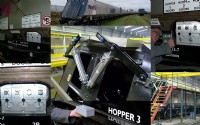Partnership leads to pneumatic control innovation for Biomass transport


Images produced care of GB Railfreight

Renewable forms of energy production along with reductions in CO2 and other emissions are becoming ever more relevant for today’s world. As part of the drive for power generation diversification within existing means, Biomass has become a method of choice. Biomass is a diverse, renewable energy source that can be used to produce energy in an eco friendly way reducing emissions. Typically it is made up of organic matter, such as crops grown specifically for energy generation, wood from forestry processing, and agricultural residues from processing or harvesting.
Over the last 11 years of trading GB Railfreight (GBRf) have worked hard on differentiating themselves from competitors, with the most recent innovation being the newly modified Biomass wagon. Manufactured with the help of partners; Midland ACS, wagon owners VTG Rail UK, W.H Davis, and Lloyd’s Register Rail, the wagons will supply Drax Power Ltd. owners and operators of the Drax Power Station.
The transportation of Biomass material for power generation does however present its own issues. The solution took an existing HYA wagon and outfitted it with roof doors to counteract the effect of biomass blow-off and spoilage by rain that would be associated with an open top wagon. A sophisticated pneumatic control system, to automatically control the loading and discharging of the Biomass was also developed. The pneumatic control system was designed and manufactured by Midland ACS, on behalf of GB Railfreight for a total of 23 wagons.
With efficiency and health and safety in mind – dust and moist biomass can ignite randomly within the pile - it was decided to build an enclosed loading and discharge station at both Port of Tyne and Drax. Both establishments would need to be automated with no personnel involved, also due to the combustible nature of the Biomass no electrical device would be permitted. The 23 wagons would open their top doors for loading, with both the top and bottom doors opening for discharge at either site.
For UK based manufacturer Midland-ACS the concept presented some major technical issues. Due to the need to eliminate any electrical input, the whole system had to run reliably on pressure alone. One of the main issues was having two systems on each wagon but only one connection pipe between them. A signal of 3.5 Bar transmitted along the rake instigated the top door cycle, while a signal of 5 Bar instigated both top and bottom door cycles.
A pneumatic pressure switch on each wagon controls cylinders, actuating arms to open or close each door depending on where in the cycle the wagon is. The top doors operating pneumatic cylinders incorporate pilot valves and a scotch bolt locking system. A further safe guard in the form of a Scotch Bolt was incorporated into the top door cylinders to provide the extra security of a mechanical lock and latch. The built in pilot valves ensure that the top doors cannot open during transit. The bottom doors are mechanically latched to ensure the safety requirements.
The loading and unloading sequence is initiated via a pneumatic magnetic switch installed on each side for the top doors and three on each side to operate the bottom doors on a individual basis. This provides greater control if the wagon’s forward motion is stopped, consequently not all the bottom doors would be opened. The same switches also close the doors on completion of loading or discharge of Biomass material.
Additionally key valves are incorporated into the wagon logic control system to provide selection between manual or automatic operation of the doors. The complete system both pneumatic actuation and pneumatic control logic, was designed in-house by Midland-ACS, taking into account the operational and safety requirements of the project and application.
Although the original outlook of the project was related to Biomass transportation, it is not too much of a stretch to imagine that these wagons and automated pneumatic controls could also be used for the transportation of other materials, even those which are not as dense, susceptible to wind carriage, or subject to water damage such as aggregates.
Midland-ACS, Tel: +44 (0)1902 305676
Website: www.midland-acs.com
Published: 10th December 2010
Rachel Wormald, Managing Director at YPS Valves Ltd and Elizabeth Waterman, ...
Are you looking for industry-leading, brand independent valve and actuator ...
As can be seen from the photograph, clearly the resident birds at Bartlett ...
Howco Group has unveiled its latest £1million investment, with the ...
In 2024, Allvalves is poised for an exciting year of growth and expansion, ...
GMM Pfaudler Engineered Plastics & Gaskets are delighted to bring the ...
In the ever-evolving valve industry, GMM Pfaudler stands out for its ...
SAMSON Controls Ltd – part of the SAMSON group - a renowned leader in ...










